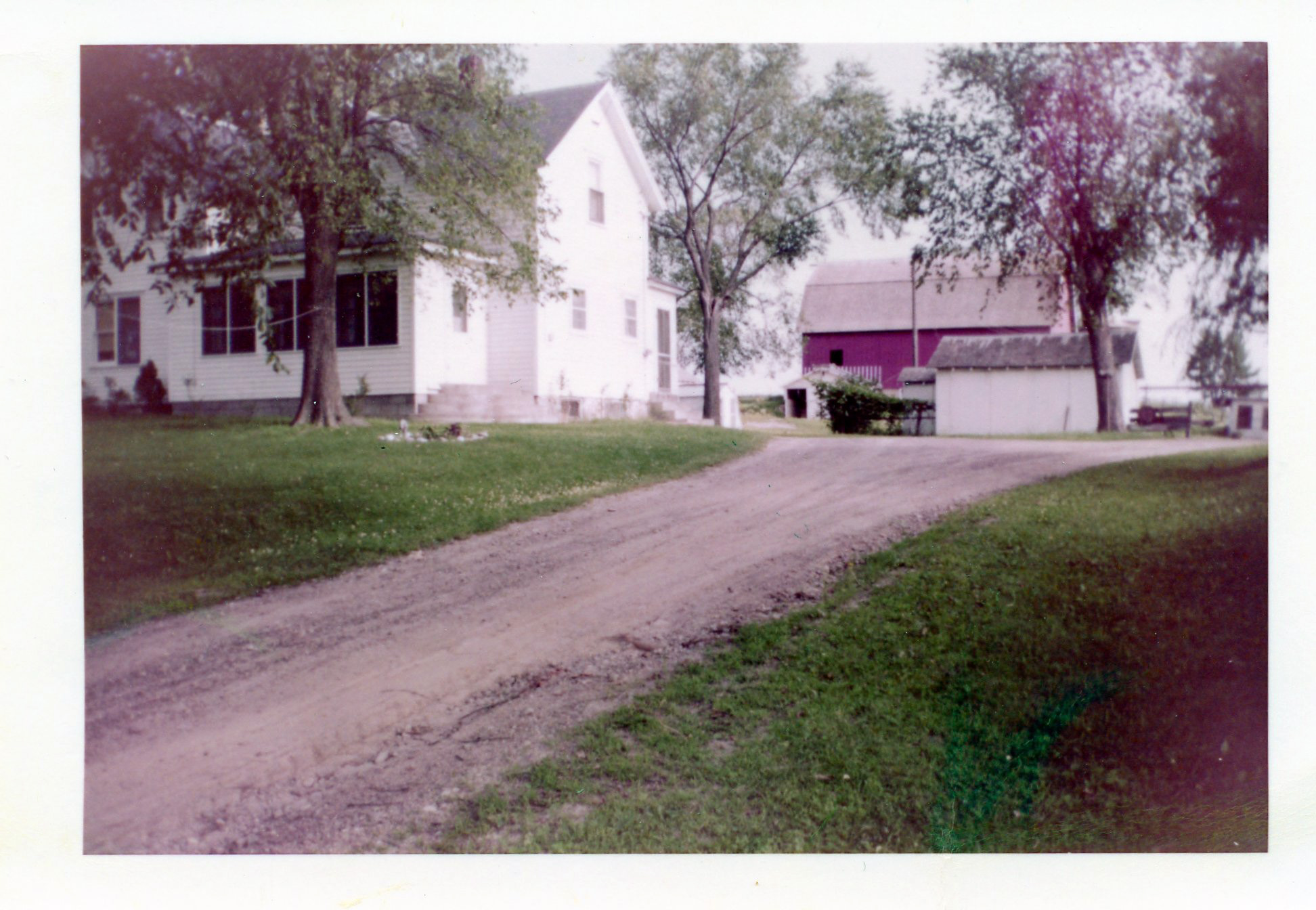
Monday, December 21, 2015
It is said 'you can take the girl from the farm but you can't take the farm from the girl'.

Growing up on a small dairy farm 5 miles from Amery Wisconsin allowed me to experience the life of a country girl. My parents Ida and Alex Swanson had 7 children: Robert born April 12, 1931 - died August 6, 1932 at the age of 15 months as complications of rheumatic fever; Betty Ann born June 8, 1934 - died July 5, 2004; Idella Mae born July 13, 1936 - died July 31, 1949; Marlin Robert born in 1938; Sylvia Marie born in 1940; Elsie Marlys born in 1943 - died March 15, 2017; and I, Grace Esther, born in 1944.
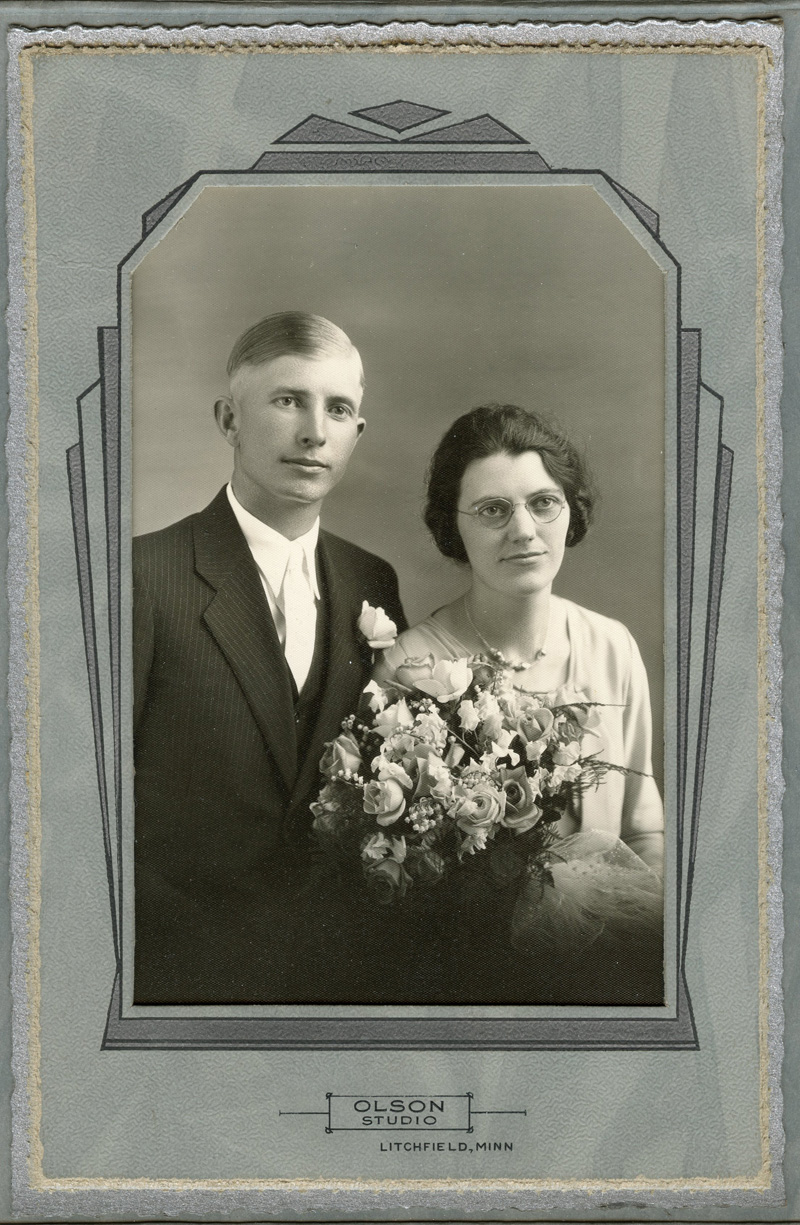
It was 1930 when my parents married and the depression took its toll on them as well as all the farm neighbors. The banker allowed dad to pay on the mortgage of the farm as he could. The druggist, the doctors and grocer also went on a 'pay when you are able' schedule. They literally saved our family from losing all. Dad's records reveal the income and expenses through very lean years. The amounts that were paid for seed, animals, medical and groceries, etc. were what took the bulk of dad's sparse income. Clothing was comprised of many hand-me-downs from relatives and friends outside our family.
When Robert died in the summer of 1932 he had been ill for 2 weeks. My aunt Hilda held him as he died and then mom and dad had to put him in a small box in the back seat of their sedan and drive to Amery as Mr. Stenberg, the mortician was busy with a funeral. We have a photo of mom sitting on the grass with Robert early summer in 1932. The Great Depression was in full swing. Her shoe bottoms were full of holes. From the few photos we have he was an adorable little boy with chubby cheeks. We also have photos from after the service at Balsam Lutheran Cemetery. Mom could have been in shock from losing her first born child. Her mother Maria had also experienced loss of her first born, a son and we have a letter written to mom in Swedish expressing the grief of one mother to another. Very heart-rending to read through it all.
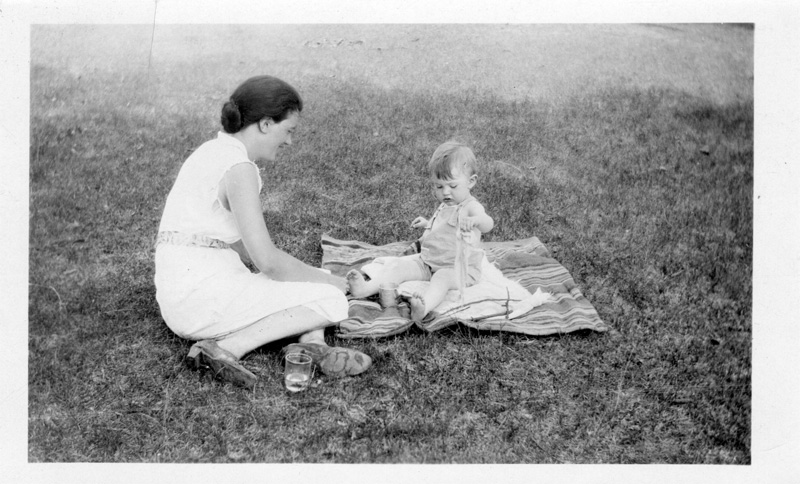
Ida and Robert 1932
My earliest recollections were from when I was not quite 5 years old. I remember standing at the foot of the wrought iron hospital bed in our farmhouse living room singing Jesus Loves Me and This Little Light of Mine to my sister Idella. Within 11 days after I turned 5 she had died from complications of meningitis; she was also plagued by juvenile diabetes and epilepsy. She spent several years at Bethesda hospital in St. Paul off and on and we had a number of people helping with our care and keeping the house while mom was off to spend days here and there with Idella. I have letters sent by her classmates when she was hospitalized. Mom wanted to have them preserved - a bit of Idella's childhood albeit short-lived.
Mom and dad were busy with the farm and the children. Often Grandma Betty Swanson provided meat and other supplies to mom and dad so there was food on the table. Mom's chickens produced eggs which Dad took to St. Paul as often as he could to grandma Betty Swanson's sister. Aunt (Axel) Hannah Carlson lived in Dayton's Bluff area at 660 Conway, a nice house overlooking St. Paul. I remember visiting her daughter Harriet (Archie) Williams as a young girl. She had a beautiful house at 661 Surrey St. which was on the street behind her parents and had a beautiful 'fainting bench' by her front door. She said I was to have that someday - a promise made to an 8 year old so it was not to be. Surrey St. is no longer on the map and a garage has replaced the house where Hannah lived.
When Marlin Robert was born in 1938, Mom went into what today could be considered post-partum depression. She had not much interest in doing things and my aunt Hilda and a young girl Lilly Peterson took care of the 3 children and the housework. In 1939 Dad was driving the family car and hit a bump. Mom hit her head and abruptly came out of what had been plaguing her. She told dad to take her home and from then on took over the child care and housework.
I was told by my siblings that I was an unexpected blessing and I filled the house with joy with my sunny disposition. I was also a bit mischievous. I climbed up on the kitchen table and 'slightly' damaged a cake, just frosted, by sitting in it. Another time I crawled up and sat at the top of the steep wooden steps that led from our living room to our upstairs bedrooms. I beamed a big smile down at Mom who was very afraid that I would tumble down and get seriously injured. Somehow I was removed from that dangerous perch!
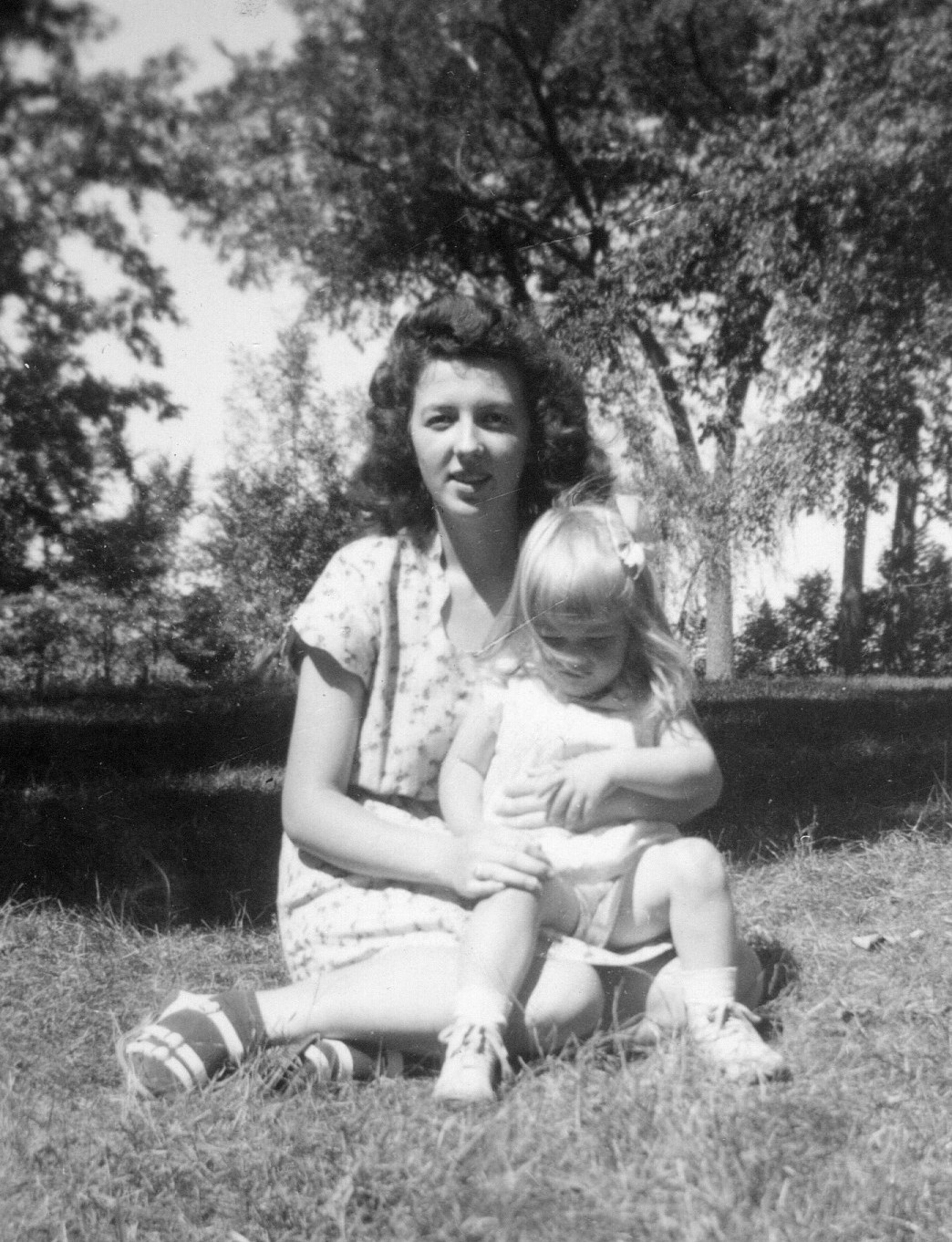
Cousin Margaret Larson and Grace 1947
page 2
Sunday, January 28, 2018
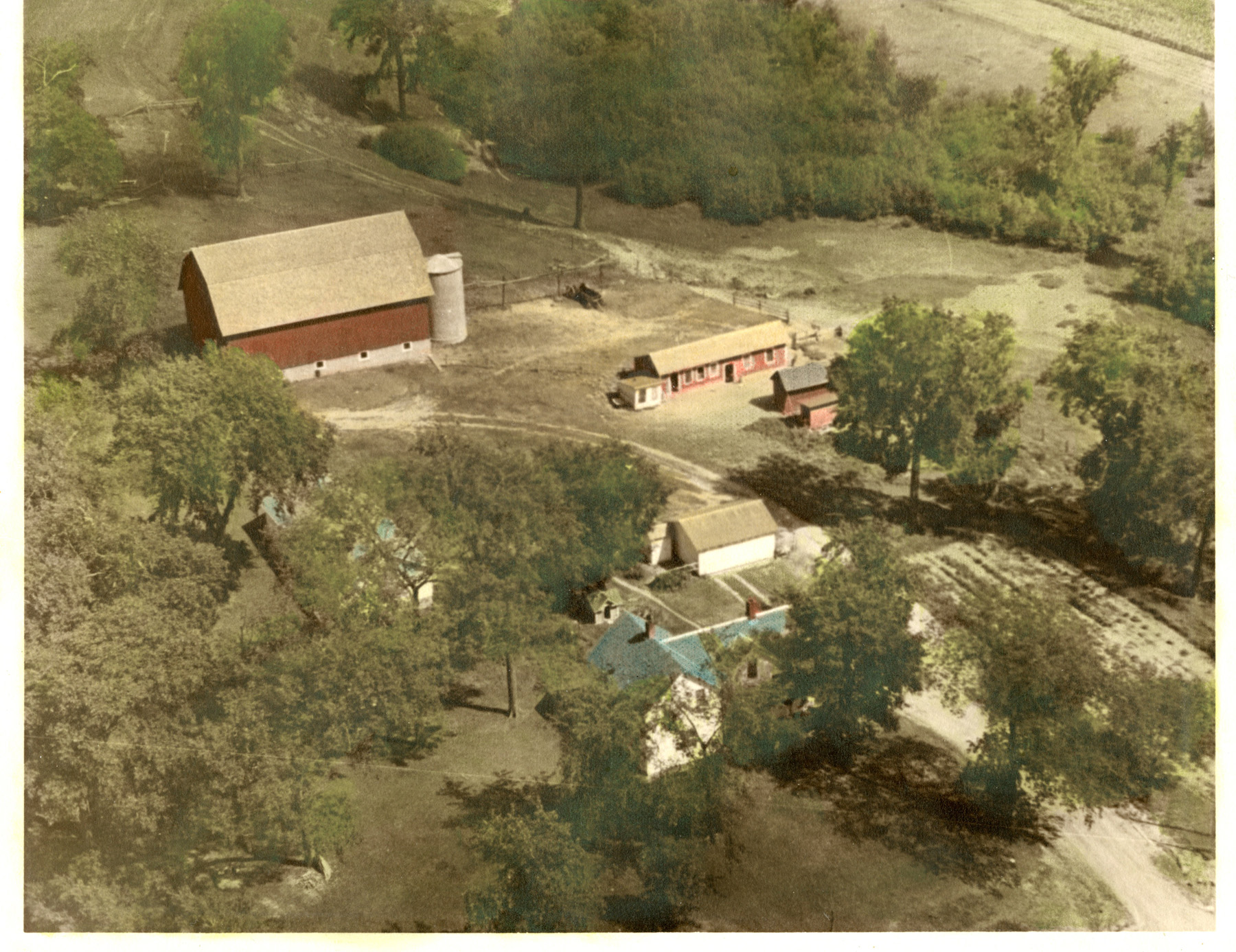
We had cows and chickens on our farm. The chicken coop was important to keep locked at night as foxes were nearby waiting for a dinner. I don't remember anytime that we forgot to lock it up but Dad would always double-check after he finished milking the cows. My sisters and I had chores as soon as we were old enough - picking eggs, carrying milk pails to the milk house to pour into the milk cans. We had a flat cart with large thin metal wheels that 4 milk cans were loaded onto when the milk hauler came. Dad did not let us girls lift the cans. That cart was used when dad wasn't looking to give rides to kids and dogs. When friends of the family visited, the boy was convinced that we would just push him around. Little did he know what we were capable of. We took him to the top of the hill by the barn, gave a push and he and the cart went flying - heading directly for the outhouse. Luckily for him and for us, it stopped before there was a disaster! When one of my friends came from town and stayed overnight, we would sit on the back of the 2 wheel wood trailer and at the count of 3 we would jump off. Our dog didn't jump with us but instead bounced in the air and we would laugh hysterically! Dad was not happy. He was worried the trailer hitch would break. The dog survived and lived out a good life in spite of our antics.
Unloading wood was dirty and heavy work. Splinters were common as we threw the wood in through the narrow basement window with my dad stacking it below. That wood had to last the cold Wisconsin winter for use in the living room stove and also for a time in the kitchen stove which was later converted to oil. Various items disappeared within that stove. Sisterly disputes resulted in valuable (to us) personal items dispensed into the fire. Nothing of real value most of the time, but it escalated when my favorite blouse was thrown into the fire. Heartbreak! That wood stove had to be tended day and night. The only heat upstairs in the 5 bedrooms came up through the registers in those bedroom floors. The windows would be thickly iced over for days. Many quilts and flannel sheets kept us warm during the cold winter nights and in the mornings we would dash downstairs to stand by the stove in the living room but mostly in the kitchen to get dressed for the day. Modesty was not in our vocabulary when it was freezing cold inside and out! Dad's white cotton long johns, among other clothing were taken in from the clothes line after we got off the school bus late afternoons. Several times I set them on the chairs around the dining room table We found this amusing but mom did not take kindly to this when they started thawing and getting the wooden chairs wet.
We had no indoor plumbing and the chamber pot was another chore that we all took turns carrying to the outhouse in the winter. Not a pleasant task and we have memories about some very eventful happenings around that chamber pot. When I was in junior high in the mid-fifties, a bathroom was added to the farmhouse by dividing the kitchen into two rooms. Mom's working space was greatly reduced but she continued to cook many meals for our family; especially for the crews at haying and grain threshing time. We were ecstatic with the changes the bathroom construction brought and the added water system in the kitchen. No more pump with cold water from the well and no more heating water in the reservoir at the side of the kitchen stove.
Outdoor play was year round. We had a cupola from atop the barn roof that my dad had fashioned into a playhouse and we spent lots of happy hours there. In the winter we went sliding down the farm hills on paper feed or fertilizer sacks. They were strong and went fast. When we hit rocks or bushes on the way down, we were slowed down a bit. Our dogs and cats went down the hills with us even though now it would be considered animal cruelty and usually they jumped off half way down and raced to the top of the hill for more exciting rides. We built 'square igloos' out of snow blocks at the end of our driveway so we could wait for the school bus out of the cold wind. We didn't have a roof, but we had high enough walls that we carved out windows on each side so we could see the bus coming. In the summer we built huts of leaves and branches in Freitags woods and also down by the creek we built some manner of play house. Our neighbors had playhouses of various structures - an old box from a truck, an unused small chicken coop etc. We didn't notice the smells and dirt.
Page 3
Sunday, January 28, 2018
Mom stitched most of our clothing on an old treadle sewing machine. Hand-me-downs were routine and being the youngest of 5 girls, my skirts and blouses were a bit 'broken in' by the time they got to me. But I didn't know the difference. Sometimes I actually got new skirts or dresses made from beautiful printed flour sacks or from fabric someone had given mom. My first pair of new shoes were purchased from the Lincoln Cash Store in Amery when I was 8 years old, were burgundy in color and had buckles I can still remember my excitement in being fit for the shoes by a clerk who maybe was used to farm kids not getting new shoes until in grade school.
When my mom and dad returned to Minnesota from Arizona in 1995, I found out that the sewing machine mom used was given to mom's sister Esther in the early 1900's by a bachelor farmer in Grove City. It had been his sisters until she passed away. The sewing machine was subsequently delivered to my cousin Margaret some years ago in Great Falls Montana. She was not aware of the connection and was very excited to have possession of the beautiful old machine still in working order that had once belonged to her mom.
Sunday was to be a day of rest at our home. Dad did the basic chores of milking the cows early morning and early evening, but not much more than that. We attended Sunday school and church at Balsam Lutheran about 5 miles from our farm. This is where the cemetery is located which contains the graves of my parents, sister Idella, brother Robert. My Swanson grandparents and dad's brother Roy are also buried there. I went with my mom early on to Ladies Aid and was probably totally bored. But I do remember tearing old sheets into strips for bandages for soldiers - by that time probably for the Korean War. But with dad in the fields and farming, mom could not have gone without us. Luther League, Confirmation and events with churches from other towns nearby was part of our church life. We had a two-point parish with Elim Lutheran at Range being our other parish. There we went for half of our confirmation classes so it was further by 5 miles for dad or another parent to drive us. No plumbing at either church left us using the outhouse which men's and women's were back to back. Not such fun times - especially in the cold of winter. The men kept a path of sorts shoveled from the church basement back door to the outhouse. There were birds, bees and mosquitos flying into the sanctuary in the summertime. June bugs were awful and I remember one time at Luther League, one of the fathers, tired from a long day, was snoring loudly in the back of the church. All of a sudden we heard a large gulp and coughing frantically . A June bug had flown in to a nice warm location- the farmers open mouth much to his horror but to the entertainment of the girls up in front.
We knew all the neighbors - some were Lutheran, some Catholic. Many of them worked together for harvest, haying and more. We couldn't have survived without teamwork that was a necessary part of farm life. Uncle Carroll Swanson lived about 4 miles from us. He and Doris who was Catholic, had 5 boys and 1 girl. As the boys grew older they helped with the farm work and were often at our farm helping my dad with some chores. I in turn, helped Aunt Doris in her kitchen while threshing and haying were going on, washing stacks of dishes from all the meals prepared for the workers. I remember peeling numerous potatoes for all the mashed potatoes she prepared. There had to be gallons and all got devoured. She worked so hard washing, cooking and gardening plus helping in the dairy barn many times. She was a gentle soul with little time for herself. In later years she had Alzheimer's and when I went to see her, the staff said she would not know me. When I stood in a doorway and looked across the activity room to where she was sitting, she looked up and a beautiful smile came across her face. I then thought she had a glimmer of days gone by conceivably of when I would be in her farm kitchen working alongside of her.
page 4
Thoughts on grade school: tunnel, fire escape, overnights, Cosmos Club, performance = sunflower girls, report cards
Thoughts on bus riding: early morning, mud in spring, noisy, bullies
Thoughts on high school - Home Ec, Band & marching band, Phy Ed, FHA, friends, class plays
1 copy photos into imagra
2 then drag them to desired text location